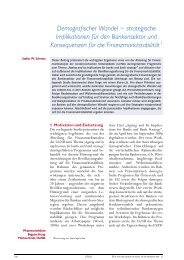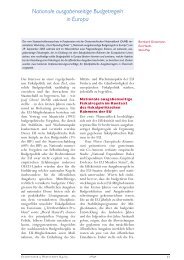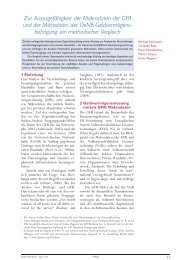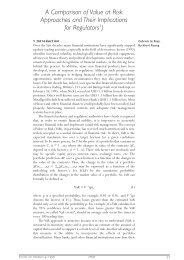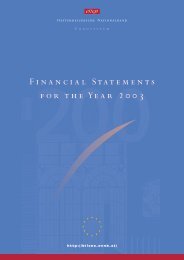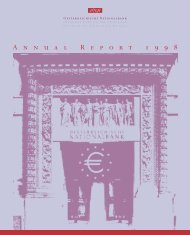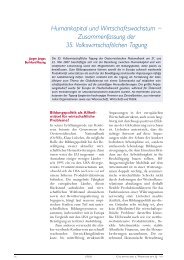You also want an ePaper? Increase the reach of your titles
YUMPU automatically turns print PDFs into web optimized ePapers that Google loves.
Poland and Slovakia posted excessive<br />
deficits in <strong>2004</strong>. In all cases but<br />
Cyprus, the Council decisions allow<br />
for the correction of these excessive<br />
deficits in a medium-term framework<br />
rather than already in 2005 given the<br />
existence of special circumstances,<br />
namely continuing structural adjustment.<br />
The debt ratios of the new<br />
Member States — except for those<br />
of Cyprus and Malta — are, incidentally,<br />
below the euro area average.<br />
In <strong>2004</strong>, the European Commission<br />
made proposals to reform the<br />
Stability and Growth Pact. The<br />
changes agreed by the Ecofin Council<br />
on March 20, 2005, and adopted by<br />
the European Council on March 22,<br />
2005, include the commitment to<br />
improve the coordination of national<br />
budgetary policies with the stability<br />
and convergence programs, statistical<br />
governance and forecast reliability.<br />
The preventive arm of the Stability<br />
and Growth Pact was altered to<br />
take into account in the definition<br />
of the medium-term objective of a<br />
budgetary position Òclose to balance<br />
or in surplusÓ factors such as potential<br />
growth, debt ratios and certain<br />
structural reforms. Moreover, the<br />
European Council Presidency conclusions<br />
stressed the importance of using<br />
periods of growth above trend more<br />
effectively for budgetary consolidation.<br />
As to the corrective aspects of the<br />
Stability and Growth Pact, it was<br />
agreed that in addition to an increased<br />
focus on debt and the longterm<br />
sustainability of public finances<br />
in establishing whether an excessive<br />
deficit exists, systemic pension reforms<br />
and Òother relevant factors,Ó<br />
such as costs associated with the unification<br />
of Europe, should be given<br />
due consideration. The deadlines for<br />
correcting an excessive deficit were<br />
extended, and the definition of Òse-<br />
The Eurosystem Secures Price Stability<br />
vere economic downturnÓ was eased.<br />
The reference values for the deficitto-GDP<br />
ratio and the debt-to-GDP<br />
ratio remained unchanged at 3%<br />
and 60%, respectively.<br />
The Governing Council of the<br />
ECB expressed serious concern that<br />
the changes to the Stability and<br />
Growth Pact could reduce the effectiveness<br />
of the EDP. It must be<br />
avoided that changes in the corrective<br />
arm undermine confidence in the<br />
sustainability of public finances in<br />
the euro area countries. The Governing<br />
Council also took note of some<br />
proposed changes which are in line<br />
with the possible strengthening of<br />
the preventive arm of the Stability<br />
and Growth Pact.<br />
Sound fiscal policies and a monetary<br />
policy geared to price stability<br />
are fundamental for EMUÕs success.<br />
They are prerequisites for macroeconomic<br />
stability, growth and cohesion<br />
in the euro area. The Governing<br />
Council underlined that it was imperative<br />
that the Member States, the<br />
European Commission and the Council<br />
of the European Union implement<br />
the revised framework in a rigorous<br />
and consistent manner conducive to<br />
prudent fiscal policies. Without<br />
transparent fiscal rules, the financial<br />
markets play a greater role in imposing<br />
discipline.<br />
Reform of the<br />
Stability and<br />
Growth Pact<br />
<strong>Annual</strong> <strong>Report</strong> <strong>2004</strong> ×<br />
29



